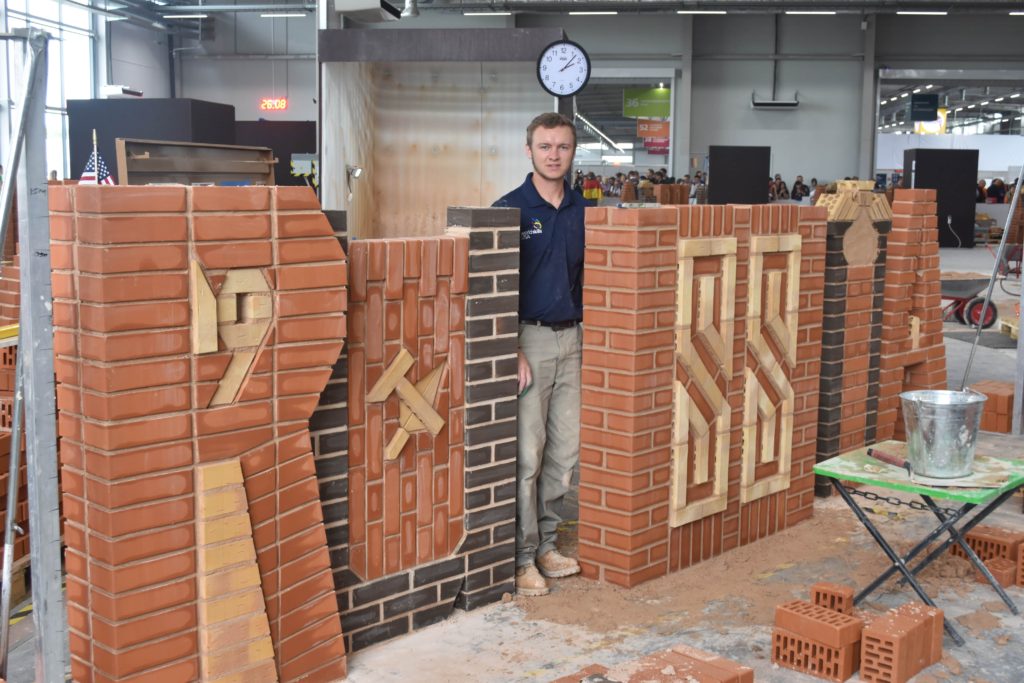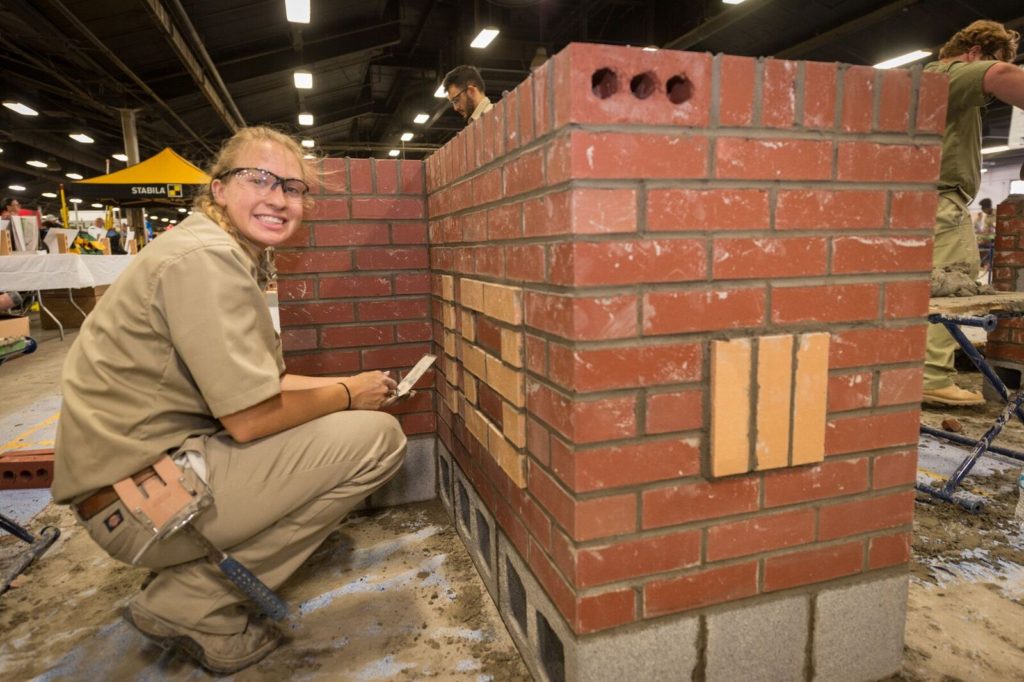A Future Set In Skills
Words: Chelle Travis, Executive Director, SkillsUSA
Photos: Ashton White, Craig Moore, SkillsUSA, Janet Cantore Watson
Like so many Americans, I rely on the high-level skills of masonry professionals every day: The sturdy, fire-resistant walls of my son’s school. The firm, level steps leading up to my front door. Even the steady, load-bearing support structures of bridges my family may cross during a drive through Virginia’s scenic countryside. Masonry remains in demand after thousands of years because it’s reliable, flexible, durable, sustainable and strong.
The benefits of masonry skills in our day-to-day lives are overwhelmingly obvious, and yet, as with so many skilled trade areas, so often taken for granted or misunderstood. Anyone actively promoting the skilled trades has no doubt heard a few of these gems on occasion: “These programs are for the students who ‘can’t cut it’ academically.” “A four-year degree is the best option.” “Career and technical education is a fallback plan.”
Have we made progress over the last few decades when it comes to changing hearts and minds about career and technical education and the skilled trades? Absolutely, and as a SkillsUSA state director for many years before becoming the national organization’s executive director, I’ve witnessed that progress firsthand.
But I believe we have a unique opportunity — today — to accelerate that progress exponentially. How do we do it? We start laying brick on a foundation that’s stronger than ever.
A Pandemic Positive
It’s hard to imagine many positives resulting from a once-in-a-lifetime global pandemic; the personal and professional challenges of the past two years have been tough for all of us. And yet, in the darkest days of the lockdowns, quarantines and confusion, many Americans began to see the light when it comes to the value of the skills they never realized they were so dependent on.
While the heroic work of our healthcare workers rightfully received the brightest glare of the spotlight, the essential nature of other skilled trades quickly became apparent, too. After all, cars still needed to be serviced, planes cleared to fly, heating and air-conditioning units installed and repaired, computers restored, teeth cleaned, and yes, masonry work performed. These skilled professionals weren’t afforded the opportunities to work from home; their skills were necessary to keep our country moving, and, as they’ve always done, they answered the call. In turn, our country began to realize an important truth: Skilled workers have always been essential … and always will be.

This new appreciation and respect for the skilled trades is certainly welcome, but it’s up to us to make sure it’s not temporary. In fact, it’s up to us as CTE leaders to build on this positive awareness, and masonry serves as a perfect metaphor to show us how.
The Total Package
The quality of any masonry build depends on a variety of factors beyond the specific technical skills of the worker. Quality tools, quality materials and design clarity are also vital components in project success. Without those, even workers with elite hands-on skills face difficult and unnecessary challenges.
In the same way, as we advocate for the skilled trades among varied audiences, it’s certainly important to begin the conversation with the empowering value of hands-on skills. It’s equally important, however, that we don’t end the conversation there.
SkillsUSA instruction is based on what we call the SkillsUSA Framework of Personal, Workplace and Technical Skills Grounded in Academics. Those three components are given equal importance in a student’s development when they join SkillsUSA. Why? Because employers have told us time and time again that they need more from a worker than the ability to perform the physical aspects of a job. They’re also looking for employees who are great teammates, reliable goal-setters (and goal-achievers), strong time managers, powerful conflict resolvers, motivating communicators … in short, entry-level workers who exemplify the total “career-ready” package.
No, I’m not describing a skilled trades unicorn here. These are exactly the types of students SkillsUSA produces every year.
Take Ashton White, for example, the first woman to win back-to-back gold medals in our national Masonry career competition at the college/postsecondary level. “Masonry hadn’t even crossed my mind as a career path until I watched the state SkillsUSA competition my sophomore year of high school,” Ashton says today. “Once I started competing, I was able to connect with companies that sponsored the contests and build a network with them, which ultimately set me up for a career. Everything was hands-on, so it really helped me understand how everything went together.”
Ashton’s technical skills grew quickly, but those personal and workplace skills weren’t far behind. “Through competitions, I was able to think critically and develop problem-solving skills as I read the plan I was given to build,” she says. “I had to adapt and overcome obstacles, because not everything goes as planned. It’s helped me become more aware of how to tackle problems in the future and build my planning and organizational skills. Having the opportunity to connect with industry helped me communicate with others and build relationships with them.”

Ashton’s standout skill set landed her internships with companies like SPEC MIX and Gates Construction Co., and she represented STABILA at the World on Concrete 2020 competition by “building a brick throne.” She’s currently a full-time student at the University of North Carolina in Charlotte, where she’s pursuing a bachelor’s degree in construction management. “Post-graduation, I will work for Carolina Masonry and Concrete doing hardscape and working toward running the apprenticeship program,” she says. She’s also started a social media presence called “That Masonry Girl,” designed to inspire other women to consider masonry as a career. You can find it on Facebook here.
Then there’s Kelby Thornton, a former SkillsUSA student who went on to represent the United States as part of the elite WorldSkills USA Team that competed in Kazan, Russia, at the 2019 WorldSkills Competition. Kelby’s masonry inspiration was his dad, and that passion for the trade led him to join SkillsUSA as a high school freshman to develop his hands-on skills and compete. It didn’t take long for him to realize that he was getting even more out of the program than he’d originally planned.

“I didn’t just build my skills physically,” he says, “but also mentally, like knowing how to make a good decision when going for great quality in a timely fashion. SkillsUSA taught me many different things, such as always striving to better myself and how to keep your head in the game. Both of these skills have helped me not only be a great mason, but also to know the value of myself and my skill.”

The value of his skills — all of them — was easy to recognize, and Kelby became an assistant foreman at his job at only 19. Today, he owns his own masonry business, “Thornton Home & Design,” and he credits SkillsUSA involvement with playing “a great role in this.”
Empowering the Connections
The examples of Ashton and Kelby are not anomalies. Their general themes are repeated many times over in the lives of countless students studying a wide variety of skilled trade areas as part of a CTSO (career and technical student organization). To these students, CTE isn’t a “second option,” but a first-choice declaration. It’s not a dead-end road, but an open path toward career success and life fulfillment. It’s not a “fallback” plan, but a clear path forward.
These are the entry-level workers industry is desperate for, ready to fill in-demand, highly skilled and high-paying jobs. They’re also the people who make our communities — and ultimately our nation — better. They exemplify the most basic dreams parents embrace for their children: to see them successful, well-educated, happy, fulfilled and worthy of praise and pride while engaging in important and essential work.
This is the perspective we need to share far more often when promoting the skilled trades and CTE, and we need to be more proactive in doing so.
As I write this, SkillsUSA is preparing for our first in-person National Leadership & Skills Conference (NLSC) since 2019. For a full week in Atlanta, from June 20-24, we’ll celebrate our next generation of skilled workers, leaders and responsible citizens. One of the highlights of the week is our SkillsUSA Championships, an event where state champions from every corner of the nation compete for national bronze, silver and gold medals in more than 100 career competitions, from 3-D Animation to Prepared Speech to Welding and everything in between.
If you’ve never attended this event, I encourage you to make it a priority, especially if you need a jolt of hope for our nation’s future. Seeing nearly 30 football fields of floor space filled by the most highly skilled students in the nation — students ready to work, lead and serve their communities — will provide an adrenaline surge that may never subside.
Masonry, by the way, is one of the most popular attractions of the SkillsUSA Championships, as observers watch these talented men and women combine craft, art and academics to create something beautiful from the ground up. As is the case with all of our career competition events, the Masonry competition is designed and judged by industry. These committee members create the rules for the competition, judge the final projects, help deliver prizes to winners and so much more.

SkillsUSA is officially defined as a partnership of students, teachers and industry, working together to ensure America has a skilled workforce. If one area of that connection isn’t secure, it’s that much harder for our students to realize their full potential.
The same holds true when evaluating the effectiveness of a student’s skill set. When technical skills carry the load alone, they produce far less power than that combustive combination of personal, workplace and technical skills together, each contributing to one mighty current that generates the most opportunities for personal and professional success in a student’s life.
As champions of the skilled trades, let’s focus on securing those connections to power the light of real, lasting change in how career and technical education is perceived, valued and celebrated. After all, there has never been a better time to be skilled — and to clearly define what the term “skilled” truly means — than right now.
Just as the structures that tend to be admired most are products of masonry construction, I can envision a not-too-distant future where the students we admire most are products of career and technical education. Together, we can build that future, a future set in skills, brick by brick.